Gluten-Free Beagle Allergy Food: Best Relief
For many Beagle owners, the rewarding experience of companionship can sometimes be tinged with the worry and frustration of their beloved dog suffering from allergies. One common culprit, and a growing concern in the canine world, is a sensitivity to gluten. If your Beagle is exhibiting tell-tale signs of itching, digestive upset, or skin issues, exploring gluten-free dog food for allergies for Beagles might be the key to unlocking their comfort and well-being.
Beagles, with their endearing personalities and energetic nature, are prone to various health issues, including allergies. While environmental factors and other ingredients can trigger reactions, gluten – a protein found in wheat, barley, and rye – is frequently identified as a problematic component for sensitive dogs. The symptoms of a gluten allergy in Beagles can manifest in several ways. Persistent itching, particularly around the paws, ears, and belly, is a hallmark sign. You might also notice excessive scratching, chewing at their skin, hot spots, and a generally dull coat. Beyond skin issues, gastrointestinal distress is another common indicator. This can include vomiting, diarrhea, gas, and changes in appetite. Observing these changes in your Beagle can be distressing for both of you, signaling that something is amiss with their current diet.
Understanding Gluten Sensitivity in Beagles
It’s crucial to differentiate between a true gluten allergy and other common food sensitivities. A true allergy involves an immune system response to a specific protein, while a sensitivity might indicate a digestive intolerance. Regardless of the exact mechanism, the end result for your Beagle is discomfort and a compromised quality of life. When considering dietary changes, especially for a breed as cherished as the Beagle, a thoughtful and informed approach is essential. This is where the concept of gluten-free dog food for allergies for Beagles comes into play, offering a targeted solution to alleviate their suffering.
The Benefits of Gluten-Free Diets for Allergic Beagles
The primary benefit of a gluten-free diet for a Beagle with a gluten allergy is the elimination of the trigger ingredient. By removing gluten from their food, you directly address the source of their allergic reaction. This can lead to a significant reduction, and often a complete resolution, of the uncomfortable symptoms they’ve been experiencing. Imagine your Beagle no longer scratching incessantly, their skin healing, and their digestive system functioning smoothly. This dietary shift can profoundly improve their overall health, energy levels, and happiness. Beyond symptom relief, a well-formulated gluten-free diet can also contribute to a healthier coat and improved nutrient absorption.
Choosing the Right Gluten-Free Dog Food for Allergies for Beagles
Navigating the vast array of pet food options can be overwhelming, but when specifically seeking gluten-free dog food for allergies for Beagles, several key factors should guide your decision.
First and foremost, scrutinize the ingredient list. Avoid any foods that contain wheat, barley, rye, or their derivatives. Look for alternative carbohydrate sources like sweet potatoes, peas, lentils, rice, or quinoa. These are often well-tolerated by dogs with sensitivities.
Secondly, consider the protein source. While gluten is a protein, allergies can also stem from common animal proteins like chicken or beef. If your Beagle’s symptoms persist even on a gluten-free diet, you might need to explore novel protein sources such as duck, lamb, venison, or fish. Hypoallergenic formulas often utilize these less common proteins to minimize the risk of further reactions.
Thirdly, look for high-quality, whole-food ingredients. Wholesome ingredients not only provide essential nutrients but are also generally easier for dogs to digest. Avoid artificial colors, flavors, and preservatives, which can sometimes exacerbate sensitivities.
Fourthly, consider your Beagle’s age, activity level, and any other underlying health conditions. Puppy formulas, adult maintenance diets, and senior formulas have different nutritional profiles. If your Beagle has other health concerns, such as kidney disease or joint issues, you’ll need to select a food that addresses those needs as well.
Finally, and most importantly, consult your veterinarian. They can help diagnose your Beagle’s allergy, rule out other medical conditions, and provide personalized recommendations for the best gluten-free dog food for allergies for Beagles. They can also advise on the transition process to a new food, which should always be done gradually to prevent digestive upset.
Transitioning Your Beagle to a New Diet
Switching your Beagle to a new food, especially a specialized diet like gluten-free dog food for allergies for Beagles, requires patience and a gradual approach. Suddenly introducing a new food can lead to digestive upset, such as vomiting or diarrhea, which can be mistaken for a continued allergic reaction.
Start by mixing a small amount of the new food with your Beagle’s current food. Aim for about 25% new food and 75% old food for the first few days. Over the next week to ten days, gradually increase the proportion of the new food while decreasing the old food. So, you’d move to a 50/50 mix, then 75% new and 25% old, and finally, a full 100% of the new food.
During this transition, closely monitor your Beagle for any changes in their behavior, appetite, and stool consistency. If you notice any adverse reactions, slow down the transition process or consult your veterinarian.
Beyond Food: A Holistic Approach to Allergy Management
While gluten-free dog food for allergies for Beagles is a significant step, a holistic approach can further enhance their relief. This might include:
Regular Grooming: Brushing your Beagle’s coat can help remove allergens and distribute natural oils, promoting skin health.
Flea and Tick Prevention: Parasites can worsen skin irritation, so consistent preventative measures are vital.
Environmental Control: If environmental allergies are suspected, try to minimize exposure to pollen, dust mites, and other irritants in your home.
Supplements: Omega-3 fatty acid supplements, often found in fish oil, can help reduce inflammation and improve skin and coat health. Always discuss supplements with your vet before introducing them.
Finding the right gluten-free dog food for allergies for Beagles can be a journey, but with careful observation, informed choices, and the guidance of your veterinarian, you can help your furry friend regain their comfort and live a happy, itch-free life. The love and dedication you have for your Beagle deserve to be met with solutions that truly address their well-being.
Meet Elyse Colburn, the devoted canine companion and storyteller behind the enchanting world of “Tales, Tails, and Adventures Unleashed.” A passionate dog enthusiast with a heart full of paw prints, Elyse Colburn shares heartwarming tales and insightful adventures, celebrating the joy, loyalty, and endless antics that make every dog a true hero. Join Elyse Colburn on this tail-wagging journey, where every post is a love letter to our four-legged friends.






